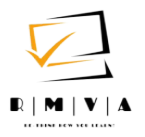Assessment Policy
R|M|V|A believes that Assessment influences the way students respond to their learning and how they behave as students. We believe that irrespective of whether the course falls within our accredited or non-accredited series of courses (it is to be noted that R|M|V|A has both accredited and non-accredited courses and there are separate policies for each of these categories) Assessments are a vital component in our efforts to improve education and an integral part of the instructional process and a central ingredient in our efforts to help students learn.
The assessments are designed to actively engage students in their own learning by requiring students to make connections and forge relationships between prior knowledge and skills, and allowing for multiple pathways for solutions and a diversity of perspectives.
Assessment is an integral part of both traditional and online education, our on-line learning environment, will include both formative and summative assessment practices.
Assessment Strategy
The assessment strategy will:
See that students develop effective cognitive, reflective and practical skills,
Provide formative assessment which supports learning process and support development,
Include both formative and summative assessment which is used to make a judgment about the achievement of particular learning outcomes,
Assist students to monitor their progression.
Categories of Assessment
Formative assessment
- Formative assessment gathers information all the way throughout a course. This information is then used to guide teaching and to improve learning and performance. The key component of formative assessment is feedback, whether the assessment is a graded quiz or written assignment or student participation in a discussion forum.
Summative assessment
- Summative assessment gathers and analyzes student at the conclusion of a course whether students have achieved identified goals. Summative assessments typically result in a score or grade. A culminating final exam or performance task is an example of a summative assessment.
Diagnostic assessment
- Diagnostic assessments are used, for example, in the admissions process and help the Academy decide which grade level would be best for a student, and which course or subject choices – as far as available – are most suitable.
Many types of assessments can – depending on the situation – serve summative and formative purposes to varying degrees.
Types E-Learning Assessments
You will assessed in variety of ways throughout the course, they are:
Multiple-choice
- These questions allow only one answer in response to a question or statement by providing radio buttons next to the answers. An option exists whereby more than one option offered can be correct
Traditional true-or-false questions
- In this type of question, a student is given only two choices to select from: true or false. The question content can include an image or html code or require an explanation
Matching questions
- Matching questions present a list of items or statements which must be correctly matched against another list of statements. Each match is equally weighted to contribute towards the mark for the total question
Short answer
- Students must type in a word or phrase in response to a question. Answers may or may not be case sensitive. Answers can be a single word or a phrase. Answers must exactly match a list of acceptable answers. The use of “wild cards” expands the options of acceptable answers
Essays
- Essays are flexible and can assess higher-order learning skills
Online, Digital or ePortfolios
- Typically, a portfolio is a collection of student work that is organised, reflected upon and presented to show content comprehension and learning growth over a period of time.
It is to be noted that:
- Assessment can be attempted multiple times and show feedback and/or correct answers (at the teacher's discretion);
- have cumulative attempts, if desired, and finished over several sessions;
- have a detailed assessment report for statistical analysis.
Security of Data
Security of data as set out in the relevant R|M|V|A policy and as defined by the POPI Act;
- able to guarantee the anonymity of students, especially in online systems;
- do not generate additional costs or fees for students beyond standard R|M|V|A fees.

Get in touch
-
3a Dune Road; Lagoon Beach; Milnerton; Cape Town; South Africa
-
info@rmva.co.za
-
+27 79 527 7263
Our Newsletter
Get weekly updates on live streams, news, tips & tricks and more.
Thank you!

